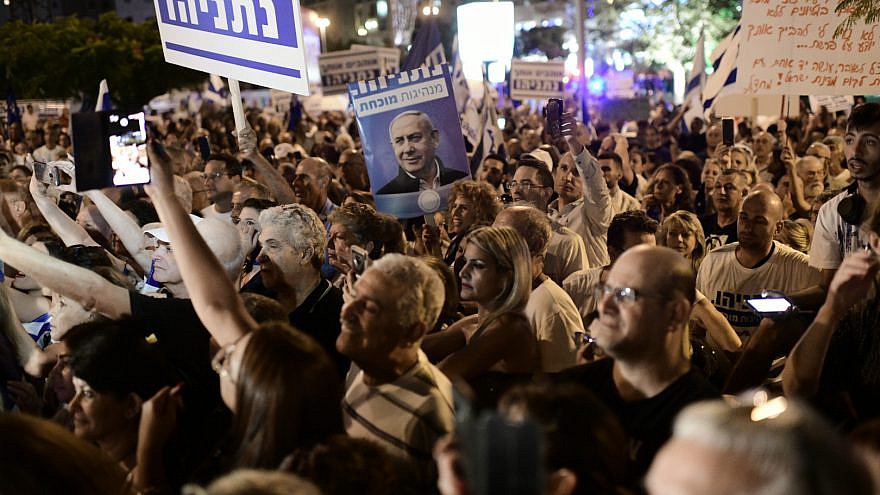Israeli Prime Minister Benjamin Netanyahu’s four days of hearings with the state prosecution are coming to an end, and all indications yield that the attorney general will move forward with his decision to indict the prime minister on corruption charges.
Justice Ministry officials involved in the hearings have revealed that “no contrary evidence to the charges” to defend the prime minister have been presented during the hearing, and “it won’t take long for us to come to a final decision.”
This is a very different message than the statement made by Netanyahu’s attorney, Amit Hadad, who said that “at the end of the day, we think these files need to be closed, and we believe that this will happen.”
Regardless of the final outcome, significant controversy has encompassed the matter after it was discovered that the prosecutor overseeing the cases against Netanyahu went on a family vacation instead of being present for the final two days of the hearing.
“This prosecution has cost the country hundreds of millions of shekelim and two elections,” Moshe Koppel, chairman of the Kohelet Police Forum, told JNS. “It behooved the head prosecutor to sacrifice her travel deposit to be present at these hearings.”
A former prosecutor told JNS on condition of anonymity that “it is so beyond comprehension that the lead prosecutor would be absent from a hearing of this magnitude—determining the fate of the country’s prime minister—that there must be something else that is being hidden in terms of her connection to the case.”
The former prosecutor then continued, saying “but she is going to be right back on the case when she returns from her vacation, so this absence really is incomprehensible.”
The Justice Ministry released a statement that the prime minister’s hearings were originally scheduled for last Wednesday and Thursday alone, and that Netanyahu’s attorney’s requested additional days just two weeks ago, after Ben-Ari’s vacation plans were made. The ministry also explained that the hearing is going to take place before the attorney general—the one authorized to make the decision regarding the indictment—therefore, Ben-Ari’s absence is inconsequential.
Another official in the state prosecutor’s office speaking with anonymity said that Ben-Ari is “an unbelievably diligent prosecutor who has not taken vacation for a long time and doesn’t stop working.”
Still, the explanation and defense of Ben-Ari’s decision has not quieted critics. Sources close to the prime minister said that her absence indicates that she has already decided his fate without giving him a fair chance in the hearing.
“She is the one who will deal with the case if it goes to court, and she needs to know every nuance,” one of Netanyahu’s aides told Channel 13.” The aide called Ben-Ari’s decision to go on vacation “scandalous.”
Prominent civil-rights attorney Avigdor Feldman told IDF Radio that “this is unthinkable. It is a scandal. I am amazed that [Avichai] Mandelblit is holding the hearing. If the process doesn’t succeed, they will say it is because the person who is most expert in the case didn’t even attend the hearing.”
Even sources from within the Justice Ministry acknowledged that Ben-Ari’s decision to go on vacation “gives a feeling of being inappropriate” and was a “misjudgment.”
From the moment the charges against the prime minister were even hinted at years ago, Netanyahu has claimed to be a victim of an effort by the police, that prosecution, the media and his political opponents to force him out of power. These four days of hearings serve as the prime minister’s only chance to convince the attorney general to back off the draft indictment against Netanyahu which he issued in February for fraud and breach of trust in three cases and bribery in one. A lead prosecutor’s absence in favor of a family vacation certainly fits the prime minister’s narrative of a system out to get him and not giving him a fair chance.
‘I do not feel alone’
More than 1,000 demonstrators took to the streets on Saturday night to show support for Netanyahu near the home of the attorney general. The prime minister released a video thanking them for their support. “This warms the heart … after seeing and hearing you, I do not feel alone.”
Last week, Israel’s President Reuven Rivlin tasked Netanyahu with forming a majority coalition of 61 Knesset seats to support him for prime minister. He has 28 days to do so, or he must give the mandate back to the president who will then give Blue and White leader Benny Gantz the chance to form a government.
It has been suggested that given the premier’s legal woes, which now includes a likely indictment and the fact that he has failed to form a government, that perhaps he will be ousted as Likud chairman or that the Likud Knesset members would support someone else for prime minister.
Nevertheless, after reports were scrapped that Likud was planning to hold a party leadership primary, the Likud Central Committee is slated to meet later this week to confirm Netanyahu as its leader.
A Walla poll has indicated that Likud maintains its strength with Netanyahu at the helm, but would lose seven mandates if another leader were to take them into the next election, further emboldening the prime minister’s position in his party.
While Israeli law allows a prime minister to remain in office while under indictment, it remains to be seen if public pressure would lead Likud to seek a new leader and bring Netanyahu’s record setting reign in the nation’s top job to an end.


























